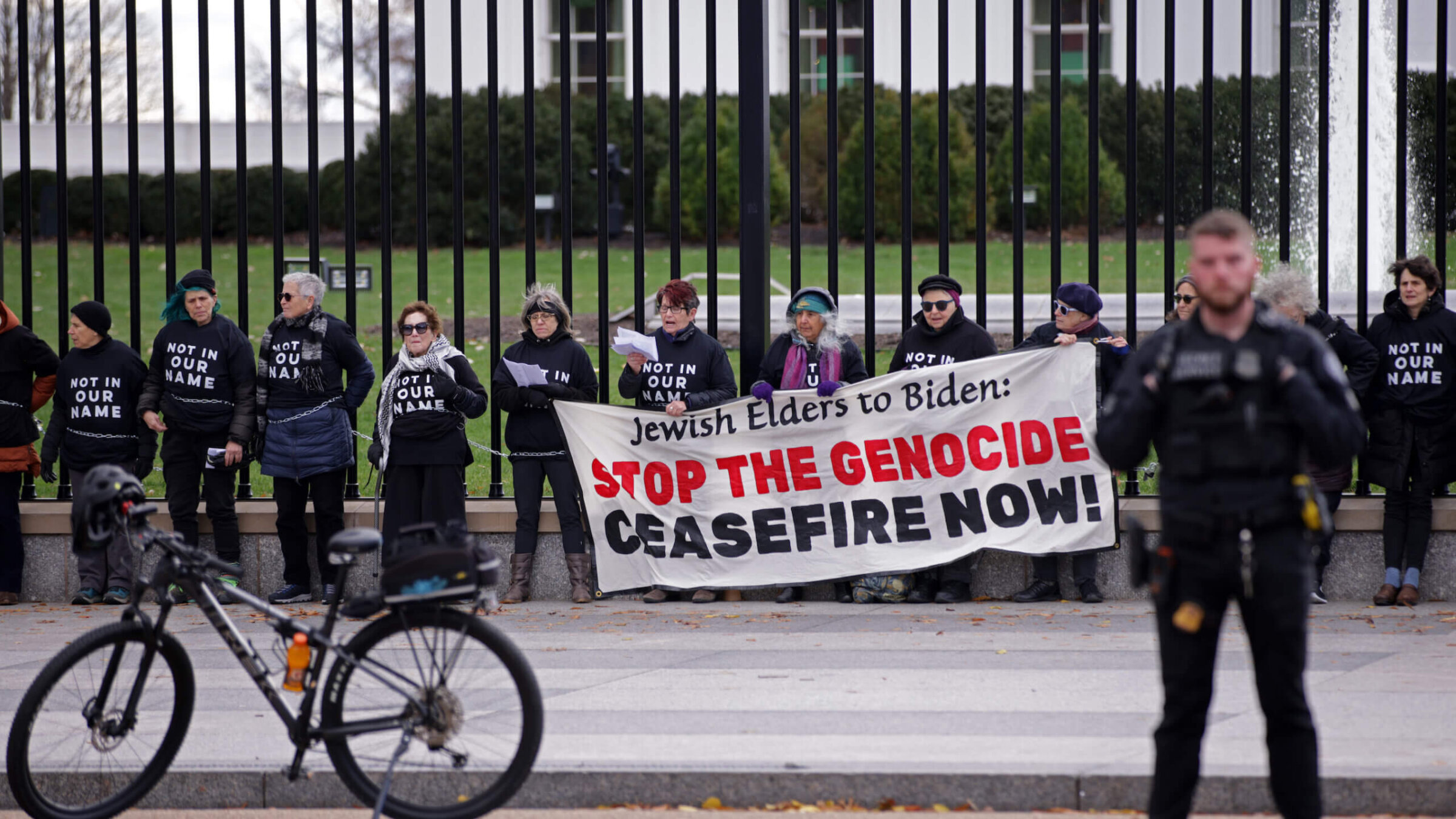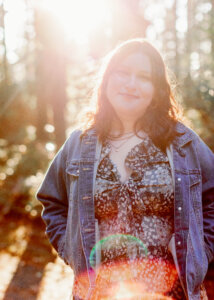Current and former members of the Union for Reform Judaism call for cease-fire
‘In the URJ, we were really taught to support oppressed people, and stop genocide,’ said the author of the letter, signed by more than 1,000 people

Jewish activists carrying a sign reading “Jewish Elders to Biden: Stop the Genocide, Cease-fire Now,” chained themselves to the fence of the White House in December 2023. Photo by Alex Wong/Getty Images
More than 1,000 current and former members of the Union for Reform Judaism released an open letter urging it to “call for an immediate cease-fire in Israel and Palestine.”
The letter was authored by Elise Glaser, 27, who has been involved in the URJ — which represents Reform Judaism, the largest denomination in North America — since she attended Hebrew school at Congregation Kol Ami in Woodinville, Washington. She was involved in its teen youth group, North American Federation for Temple Youth (NFTY) and, during college, interned with the Religious Action Center of Reform Judaism in Washington, D.C., where she worked on programs to help end child hunger.
Feeling powerless as she absorbed images on Instagram of the war in Gaza, Glaser said she felt moved to write the letter because of the network of people she’s met through the organization over the years.
“If I have personal relationships with people that are leading one of the biggest Jewish organizations in the U.S., that has lobbying power and influence, I should try to use that influence,” Glaser said. “In the URJ, we were really taught to support oppressed people, and stop genocide. I just couldn’t understand how an organization that had taught me so many of these amazing values is able to kind of turn a blind eye when we’re seeing articles about the indiscriminate killing of children and citizens.”
Glaser initially distributed the letter for signatories last Monday. She wanted to get 100 signatures. Now, it has around 1,100.
“I thought it would circulate my friend group of NFTY alumni and camp alumni,” Glaser said. “I think what this petition shows is that there’s so many people that did want to have a voice.”
For Glaser, one of the most important aspects of the letter was to show the URJ that these weren’t “random people that support a cease-fire.”
They are “core people,” Glaser said. “I think a lot of them are my age, in their 20s and 30s. We grew up in the URJ. I wanted them to look at these 1,000 people that don’t agree with their stance on Israel. How are you going to reconcile that? Who is going to be your URJ temple president in 10 or 15 years, if all of these people are no longer agreeing with you on really important policies around Israel?”
While collecting signatures, Glaser asked people to provide their reasons for signing onto the letter. These responses are posted anonymously on the website that hosts the letter. One in particular stood out to her.
“I am an alum of Temple B’Nai Israel, NFTY, BBYO, and Crane Lake Camp,” the anonymous signatory wrote. “I am the descendant of Holocaust refugees including my grandmother and great-grandparents, and relative of 28 family members murdered in the Holocaust, as well as the spouse of a Muslim Palestinian and parent of two beautiful Palestinian kids who has been detained, interrogated, denied entry, and subject to entry restrictions by the state of Israel. I am appalled to see the URJ’s complicity in the ongoing occupation, siege, starvation, bombardment, mass displacement and attempted genocide of Palestinians, the majority of whom are innocent women and children. We must stand up for values of justice and sanctity of life. Palestinians deserve safety, life, and dignity. Never again means never again for ANYONE including my beloved Palestinian family.”
She and another group composed of children of former URJ rabbis and temple leaders, who reached out to her to collaborate after seeing her letter in circulation, coordinated to send their letters to the URJ at the same time: Saturday, Dec. 16, as the URJ celebrated its 150th anniversary in Washington, D.C. Glaser noted that Rabbi Rick Jacobs, the URJ’s president, addressed the “generational divide” between Reform Jews in his Shabbat sermon, as reported by The Washington Post.
“A significant number of younger Jews are struggling with the war in Gaza and the American Jewish community’s strong support of Israel’s prosecution of the war,” Jacobs said. He added: “They wrestle with these complex moral issues drawing on the justice and equity values they learned in their Jewish upbringing, and offer principled, thoughtful arguments for their views of the war.”
The URJ, which released a statement on Oct. 27 advocating for a humanitarian pause on the Israeli military campaign in Gaza to allow aid to reach Palestinian civilians, has not called on Israel to institute a cease-fire.
“We appreciate the conviction to speak out and value the ongoing contributions of the many members of our movement who are offering their views and voices as we continue to wrestle with the complex moral issues concerning the war,” Laura Frank, a spokesperson for the URJ, said in an email. “The Reform movement has not called for a cease-fire so long as Hamas has the ability to launch further attacks. However, we are keeping a close eye on the cease-fire issue, recognizing the moral conviction of wanting the killing to stop.”
Glaser pointed out that while some might read the letter’s criticism of the URJ’s response to the war as a sign that young people could disengage from the Reform movement, she said it comes from a place of belonging to the URJ community.
“I don’t think we all want to abandon the URJ,” Glaser said. “I think we want them to be consistent in their stances around human rights.”






















